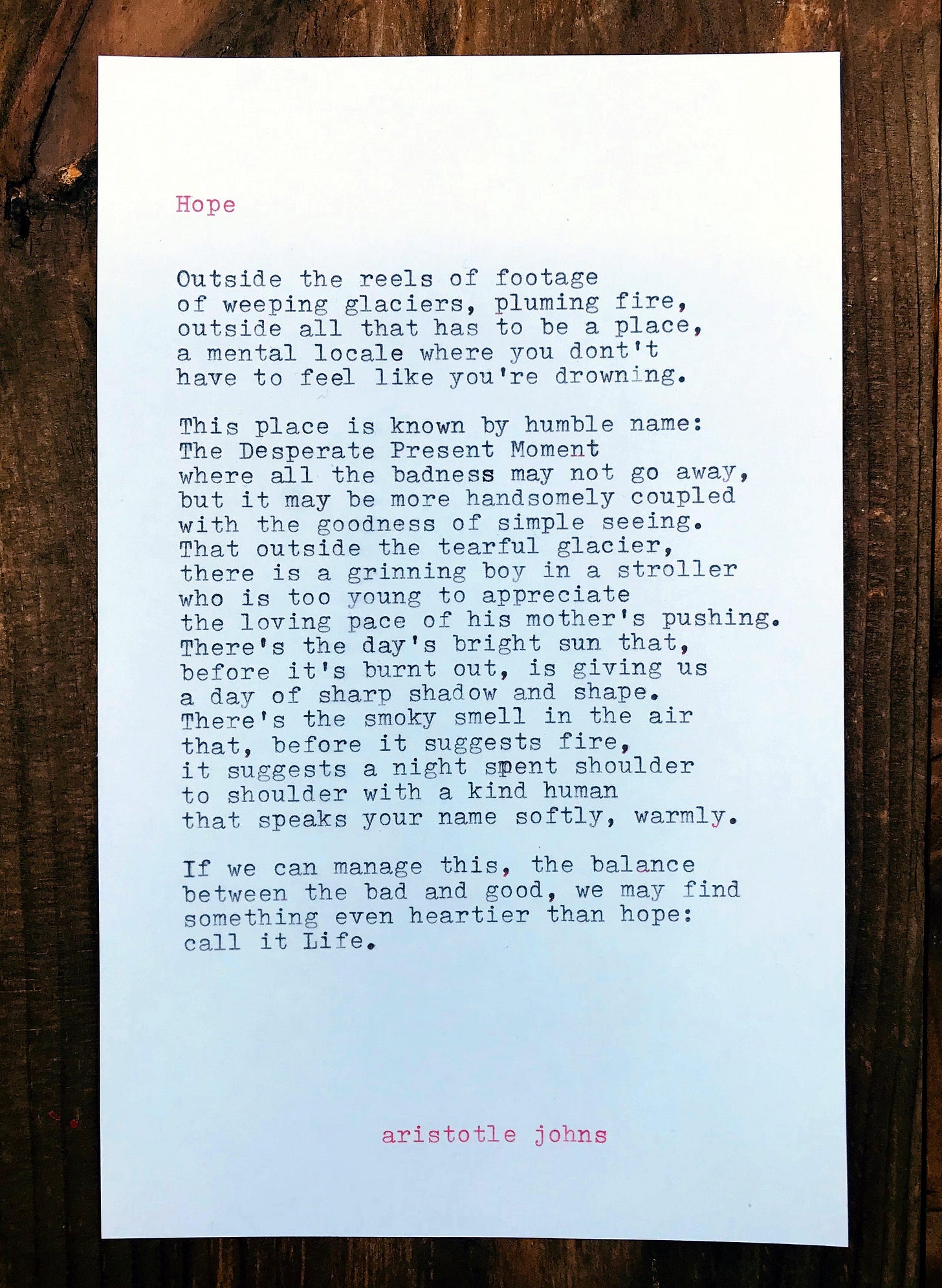If you read the news at all, scroll through Instagram and Twitter or live in an area affected by climate change (i.e., the planet), you may feel anxious about the state of our home and the future of all of its inhabitants. I hope the following coping strategies help.
Take action
For many people, including myself, taking some sort of action to address climate change helps reduce their eco-anxiety—protesting, eating more vegetables, electrifying your appliances, contacting politicians. (For others, taking action may not alleviate anxiety.)
At the same time, remember to take care of yourself. Don’t let your activism—which does not garner results overnight—lead to burnout. Try to eat well, sleep enough and exercise regularly.
Or take a break
Take a break from work, productivity guilt or environmentalism when you need to. And take regular breaks from social media.
We have never before had the ability to consume breaking news, mis- and disinformation during every waking hour if we choose to. No wonder people feel anxious. Not that we should stick our heads in the sand like climate deniers. However, constantly reading bad news can send us into a perpetual state of rage or convince us that we’re all doomed, which leads to paralysis.
By putting your phone away, you’ll likely find more relaxing things to do—reading a book, writing in a journal, going for a hike or making something. When not on a digital fast, I still attempt to limit my phone use. To avoid checking it for the time, I wear a good, old-fashioned, self-winding watch. When I cook, I set the oven timer rather than the timer on my phone. These tactics help keep me focused and in the moment.
Get out in nature
A 2019 study into the health benefits of exposure to nature showed that a mere two hours weekly spent out in a park, the woods or the beach boosts health and wellbeing, whether we take that two-hour dose in one shot or in small snippets throughout the week.
Of those who spent little or no time in nature, a quarter reported poor health and almost half said they were not satisfied with their life, a standard measure of wellbeing. In contrast, just one-seventh of those who spent at least two hours in nature said their health was poor, while a third were not satisfied with their life.
Learn a new skill
Become more self-sufficient and learn skills that will stand you in good stead in a changing climate. Consumerism and our reliance on convenience have rendered skills such as gardening, cooking, sewing, knitting, carpentry and so on as, well, quaint. These skills not only boost your self-sufficiency, they can also be meditative, which reduces anxiety.
Sign up for the Gen Dread newsletter
Britt Wray, an author and broadcaster, started the newsletter Gen Dread after becoming overwhelmed by eco-anxiety and climate grief—and learning how to deal with that stress. From the Gen Dread’s description:
The age of eco-anxiety is upon us and climate-aware therapists are just a call away, meanwhile, the afterglow of climate disasters radiates traumatic psychiatric injuries throughout the globe. We need to get wise to what is happening and what we can do about it, so we don’t lose all our marbles. Consider this newsletter the clearing house for new, old, and emerging ideas to strengthen our emotional intelligence, psychological resilience, and mental health while we’re in this planetary pickle.
Register for the newsletter here.
Seek professional help
If your eco-anxiety disrupts your sleeping or eating, keeps you from thinking of anything but environmental doom, causes panic attacks or prevents you from enjoying your favorite activities, seek professional help. Do not feel ashamed if you need to speak with someone! If you broke your leg, you wouldn’t try to set it yourself. I’ve had therapy in the past and think everyone can benefit from it. Ask your primary caregiver for a referral. Search here for a climate-aware therapist. During Covid, you may have to wait a while, unfortunately.
Seek out a group
If you can’t find a therapist, you may find a group that you can join to discuss your feelings about the climate crisis.
The Good Grief Network (GGN)
The GGN describes itself as follows:
Our unique 10-Step Program helps individuals and communities build resilience by creating spaces where people can lean into their painful feelings about the state of the world and reorient their lives toward meaningful action.
You can join a group or receive training to start your own group. The next group begins on February 3rd.
Climate Cafés
These too are online gatherings of people worried about climate change. The Climate Café website explains it this way: “Meet with other people and take turns expressing how climate and ecological breakdown makes you feel.” The next event takes place on February 19th.
All We Can Save Circles
Created by Dr. Katharine Wilkinson, co-editor of the anthology, All We Can Save, Circles are “like a book club, but a cooler, deeper, extended version. Let’s strengthen the ‘we’ in All We Can Save.” Go here for more information on starting your own circle.
Meditate or practice yoga or do both
If you feel anxious and have never meditated before, don’t expect to eliminate your anxiety immediately the first time you hunker down into lotus position. You’ll need to practice meditation regularly (preferably daily) before the anxiety-reducing benefits can kick in. I learned to meditate using the hong-sau method. It works! Yoga provides similar anxiety-reducing effects. Both yoga and meditation will help with the next strategy.
Learn to live in the moment
A bit before lockdowns began in 2020, I met a poet named Aristotle Johns at the farmers’ market in Palo Alto. A sign taped to his small typewriter table read, “Free poems. Give me a prompt, I’ll give you a poem.” So I asked him to write me a poem about hope and told him that I read and write about the environment. After I finished buying my produce for the week, I stopped back at Aristotle’s table and picked up my poem. I was impressed that he wrote something so poignant, so quickly.
© Aristotle Johns






What a beautiful treasure from Aristotle Johns. Thank you for sharing and of course for all the ideas you presented!
Wow! Love the poem!